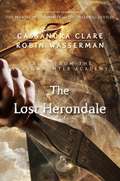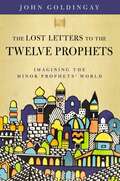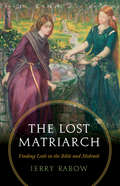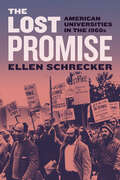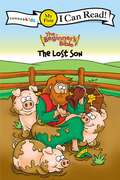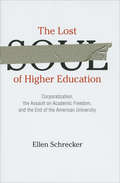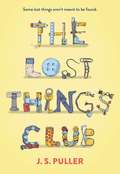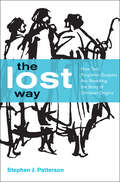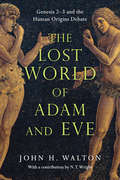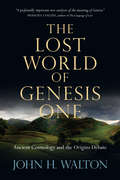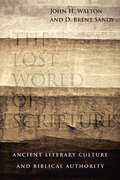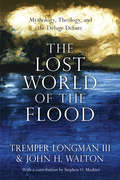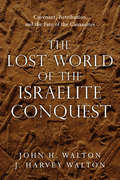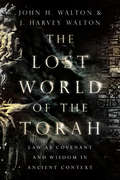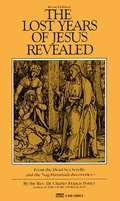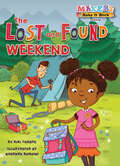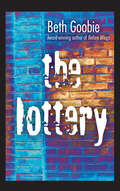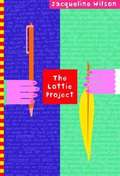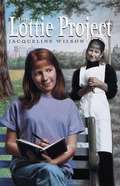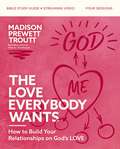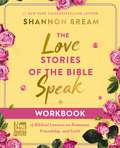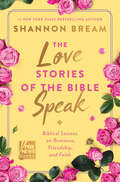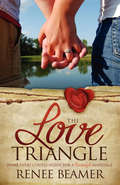- Table View
- List View
The Lost Herondale
by Robin Wasserman Cassandra ClareSimon learns the worst crime a Shadowhunter can commit: desertion of their comrades. One of ten adventures in Tales from the Shadowhunter Academy.In the early nineteenth century, Tobias Herondale abandoned his fellow Shadowhunters in the heat of battle and left them to die. His life was forfeit, but Tobias never returned, and the Clave claimed his wife's life in exchange for Tobias's. Simon and his fellow students are shocked to learn of this brutality, especially when it is revealed the woman was pregnant. But what if the child survived...could there be a lost Herondale line out in the world today?This standalone e-only short story follows the adventures of Simon Lewis, star of the #1 New York Times bestselling series The Mortal Instruments, as he trains to become a Shadowhunter. Tales from the Shadowhunter Academy features characters from Cassandra Clare's Mortal Instruments, Infernal Devices, and the upcoming Dark Artifices and Last Hours series. The Lost Herondale is written by Cassandra Clare and Robin Wasserman.
The Lost Letters to the Twelve Prophets: Imagining the Minor Prophets' World
by Dr. John GoldingayUnderstand the Prophets Like Never Before with Amazing Insights from One of Today's Foremost Old Testament ScholarsFor many Christians reading the Old Testament, trying to understand Israel's prophets is like listening to just one side of a phone conversation--you only get half the idea of it. You hear the answer, but how do you know what question the prophet is answering?In The Lost Letters to the Twelve Prophets, John Goldingay uncovers the questions behind the prophets' answers that make their meaning and relevance intelligible to us. Written as a series of imaginary letters to the twelve Minor Prophets, The Lost Letters to the Twelve Prophets asks the kinds of questions that Hosea, Micah, Zechariah, and others were answering. The letters make clear the issues these prophets of Israel were dealing with or deliver the news they were responding to in their Old Testament writings. For example,To Hosea: Why did you marry someone you knew might be unfaithful?To Joel: It looks as if a locust epidemic is on the way: what should we do?To Amos: What should we do about the war crimes of peoples around us?To Obadiah: The Edomites have occupied our land and pushed us out: what's up with that?To Jonah: When is God going to fulfill his undertaking to destroy Nineveh?To Micah: Will God always be angry with us as a people?To Nahum: When is God going to fulfill his undertaking to destroy Nineveh?To Habakkuk: When is God going to do something about injustice in Judah?To Zephaniah: What do you mean by "the day of the Lord"?To Haggai: When is God going to fulfill his promises about rebuilding the temple?To Zechariah: Should Jeshua be High Priest when he has been in an unclean land?To Malachi: Why does serving God seem pointless?These and other questions help readers peer behind the veil of Minor Prophets' utterances and unlock their significance for today's Christians. Each chapter:begins with a brief paragraph of background about the prophetrecounts questions or reports that have been addressed to the prophet in the form of a lettersums up message of the prophet responding to that questionoffers a brief comment or explanation after each passageThe Lost Letters to the Twelve Prophets offers an imaginative, fun, and engaging way for students, pastors, and all serious Bible readers get a better grip on what is happening in these often misunderstood biblical books and get more out of their Bible reading and study.
The Lost Matriarch: Finding Leah in the Bible and Midrash
by Jerry RabowThe Lost Matriarch offers a unique response to the sparse and puzzling biblical treatment of the matriarch Leah. Although Leah is a major figure in the book of Genesis, the biblical text allows her only a single word of physical description and two lines of direct dialogue. The Bible tells us little about the effects of her lifelong struggles in an apparently loveless marriage to Jacob, the husband she shares with three other wives, including her beautiful younger sister, Rachel. Fortunately, two thousand years of traditional and modern commentators have produced many fascinating interpretations (midrash) that reveal the far richer story of Leah hidden within the text. Through Jerry Rabow’s weaving of biblical text and midrash, readers learn the lessons of the remarkable Leah, who triumphed over adversity and hardship by living a life of moral heroism. The Lost Matriarch reveals Leah’s full story and invites readers into the delightful, provocative world of creative rabbinic and literary commentary. By experiencing these midrashic insights and techniques for reading “between the lines,” readers are introduced to what for many will be an exciting new method of personal Bible interpretation.
The Lost Promise: American Universities in the 1960s
by Ellen SchreckerThe Lost Promise is a magisterial examination of the turmoil that rocked American universities in the 1960s, with a unique focus on the complex roles played by professors as well as students. The 1950s through the early 1970s are widely seen as American academia’s golden age, when universities—well-funded and viewed as essential for national security, economic growth, and social mobility—embraced an egalitarian mission. Swelling in size, schools attracted new types of students and professors, including radicals who challenged their institutions’ calcified traditions. But that halcyon moment soon came to a painful and confusing end, with consequences that still afflict the halls of ivy. In The Lost Promise, Ellen Schrecker—our foremost historian of both the McCarthy era and the modern American university—delivers a far-reaching examination of how and why it happened. Schrecker illuminates how US universities’ explosive growth intersected with the turmoil of the 1960s, fomenting an unprecedented crisis where dissent over racial inequality and the Vietnam War erupted into direct action. Torn by internal power struggles and demonized by conservative voices, higher education never fully recovered, resulting in decades of underfunding and today’s woefully inequitable system. As Schrecker’s magisterial history makes blazingly clear, the complex blend of troubles that disrupted the university in that pivotal period haunts the ivory tower to this day.
The Lost Son: Based On Luke 15:11-32 (I Can Read! #My First Shared Reading)
by Various AuthorsThis story of the prodigal son teaches the power of God’s love and forgiveness. God is always happy when lost people come back to him. Readers experience the love of God through the story of a loving father in this My First level book.
The Lost Soul of Higher Education: Corporatization, the Assault on Academic Freedom, and the End of the American University
by Ellen SchreckerThe professor and historian delivers a major critique of how political and financial attacks on the academy are undermining our system of higher education. Making a provocative foray into the public debates over higher education, acclaimed historian Ellen Schrecker argues that the American university is under attack from two fronts. On the one hand, outside pressure groups have staged massive challenges to academic freedom, beginning in the 1960s with attacks on faculty who opposed the Vietnam War, and resurfacing more recently with well-funded campaigns against Middle Eastern Studies scholars. Connecting these dots, Schrecker reveals a distinct pattern of efforts to undermine the legitimacy of any scholarly study that threatens the status quo. At the same time, Schrecker deftly chronicles the erosion of university budgets and the encroachment of private-sector influence into academic life. From the dwindling numbers of full-time faculty to the collapse of library budgets, The Lost Soul of Higher Education depicts a system increasingly beholden to corporate America and starved of the resources it needs to educate the new generation of citizens. A sharp riposte to the conservative critics of the academy by the leading historian of the McCarthy-era witch hunts, The Lost Soul of Higher Education, reveals a system in peril—and defends the vital role of higher education in our democracy.
The Lost Things Club
by J. S. PullerFans of Rebecca Stead and Lynda Mullaly Hunt will embrace this heartwarming story about the effects of grief, the power of friendship, and learning that sometimes not all lost things are meant to be found.When twelve-year-old Leah goes to spend the summer in Chicago with her little cousin TJ, she's shocked to discover that he's gone mute after surviving a school shooting. She knows there isn't a "right way" to deal with his pain, but when she learns that he's sneaking out to visit a laundromat at night, it seems all wrong.Determined to discover why the laundromat brings her cousin to life, Leah and her new friend Violet follow him, unwittingly falling into an imaginary world called "The Land of Lost Things," home to the socks and coins and buttons that disappear in the dryer. And when TJ hears about the wonders beyond the portal in the back of the dryer, he actually speaks!Eager to keep him talking, Leah and her new friends populate the world with characters, performing elaborate puppet shows that grab the attention of YouTube viewers everywhere. Soon Leah realizes that there's something in this special world that TJ has to find and get back. But as the Lost Things Club works together to try and make TJ's dreams a reality, they learn there are some lost things that can't come back.
The Lost Wallet (Primary Phonics #Set 5 Book 7)
by Barbara W. MakarA systematic, phonics-based early reading program that includes: the most practice for every skill, decodable readers for every skill, and reinforcement materials--help struggling students succeed in the regular classroom
The Lost Way: How Two Forgotten Gospels Are Rewriting the Story of Christian Origins
by Stephen J. PattersonIn this rigorously researched and thoughtful study, a leading Jesus Seminar scholar reveals the dramatic story behind the modern discovery of the earliest gospels, accounts that do not portray Jesus exclusively as a martyr but recover a lost ancient Christian tradition centered on Jesus as a teacher of wisdom.The church has long advocated the Pauline view of Jesus as deity and martyr, emphasizing his death and resurrection. But another tradition also thrived from Christianity’s beginnings, one that portrayed Jesus as a teacher of wisdom. In The Lost Way, Stephen Patterson, a leading New Testament scholar and former head of the Jesus Seminar, explores this lost ancient tradition and its significance to the faith.Patterson explains how scholars have uncovered a Gospel that preceded at least three of those in the Bible, which is called Q. He painstakingly demonstrates how historical evidence points to the existence of this common source in addition to Mark—recognized as the earliest Gospel—that both Matthew and Luke used to write their accounts. Q contained a collection of Jesus’s teachings without any narrative content and without accounts of the passion, though being the earliest version shared among his first followers—scripture that embodies a very different orientation to the Christian faith.Patterson also explores other examples of this wisdom tradition, from the discovery of the Gospel of Thomas; to the emergence of Apollos, a likely teacher of Christian wisdom; to the main authority of the church in Jerusalem, Jesus’s brother James. The Lost Way offers a profound new portrait of Jesus—one who can show us a new way to live.
The Lost World of Adam and Eve: Genesis 2-3 and the Human Origins Debate (The Lost World Series #Volume 1)
by John H. Walton2016 Christianity Today Biblical Studies Award of Merit For centuries the story of Adam and Eve has resonated richly through the corridors of art, literature and theology. But for most moderns, taking it at face value is incongruous. And even for many thinking Christians today who want to take seriously the authority of Scripture, insisting on a "literal" understanding of Genesis 2–3 looks painfully like a "tear here" strip between faith and science. How can Christians of good faith move forward? Who were the historical Adam and Eve? What if we've been reading Genesis—and its claims regarding material origins—wrong? In what cultural context was this couple, this garden, this tree, this serpent portrayed? Following his groundbreaking Lost World of Genesis One, John Walton explores the ancient Near Eastern context of Genesis 2–3, creating space for a faithful reading of Scripture along with full engagement with science for a new way forward in the human origins debate. As a bonus, an illuminating excursus by N. T. Wright places Adam in the implied narrative of Paul's theology. The Lost World of Adam and Eve will be required reading for anyone seeking to understand this foundational text historically and theologically, and wondering how to view it alongside contemporary understandings of human origins.
The Lost World of Genesis One: Ancient Cosmology and the Origins Debate (The Lost World Series #Volume 2)
by John H. WaltonIn this astute mix of cultural critique and biblical studies, John H. Walton presents and defends twenty propositions supporting a literary and theological understanding of Genesis 1 within the context of the ancient Near Eastern world and unpacks its implications for our modern scientific understanding of origins.Ideal for students, professors, pastors and lay readers with an interest in the intelligent design controversy and creation-evolution debates, Walton's thoughtful analysis unpacks seldom appreciated aspects of the biblical text and sets Bible-believing scientists free to investigate the question of origins.
The Lost World of Scripture: Ancient Literary Culture and Biblical Authority (The Lost World Series #Volume 3)
by John H. Walton Brent Sandy2014 Readers' Choice Awards Honorable MentionPreaching's Preacher's Guide to the Best Bible Reference for 2014 (Scripture/Hermeneutics) From John H. Walton, author of the bestselling Lost World of Genesis One, and D. Brent Sandy, author of Plowshares and Pruning Hooks, comes a detailed look at the origins of scriptural authority in ancient oral cultures and how they inform our understanding of the Old and New Testaments today. Stemming from questions about scriptural inerrancy, inspiration and oral transmission of ideas, The Lost World of Scripture examines the process by which the Bible has come to be what it is today. From the reasons why specific words were used to convey certain ideas to how oral tradition impacted the transmission of biblical texts, the authors seek to uncover how these issues might affect our current doctrine on the authority of Scripture. "In this book we are exploring ways God chose to reveal his word in light of discoveries about ancient literary culture," write Walton and Sandy. "Our specific objective is to understand better how both the Old and New Testaments were spoken, written and passed on, especially with an eye to possible implications for the Bible?s inspiration and authority."
The Lost World of the Flood: Mythology, Theology, and the Deluge Debate (The Lost World Series #Volume 5)
by Tremper Longman III John H. Walton Stephen O. Moshier"The flood continued forty days on the earth; and the waters increased, and bore up the ark, and it rose high above the earth . . . and the ark floated on the face of the waters" (Gen 6:17-18 NRSV). In modern times the Genesis flood account has been probed and analyzed for answers to scientific, apologetic, and historical questions. It is a text that has called forth "flood geology," fueled searches for remnants of the ark on Mount Ararat, and inspired a full-size replica of Noah's ark in a theme park. Some claim that the very veracity of Scripture hinges on a particular reading of the flood narrative. But do we understand what we are reading? Longman and Walton urge us to ask what the biblical author might have been saying to his ancient audience. Our quest to rediscover the biblical flood requires that we set aside our own cultural and interpretive assumptions and visit the distant world of the ancient Near East. Responsible interpretation calls for the patient examination of the text within its ancient context of language, literature, and thought. And as we return from that lost world to our own, we will need to ask whether geological science supports the notion of flood geology. To read Longman and Walton is to put our feet on firmer interpretive ground. Without attempting to answer all of our questions, they lift the fog of modernity and allow the sunlight to reveal the true contours of the text. As with other books in the Lost World series, The Lost World of the Flood is an informative and enlightening journey toward a more responsible reading of a timeless biblical narrative.
The Lost World of the Israelite Conquest: Covenant, Retribution, and the Fate of the Canaanites (The Lost World Series #Volume 4)
by John H. Walton J. Harvey WaltonThe Lost World of the Israelite ConquestheremThe Lost World of the Israelite Conquest
The Lost World of the Torah: Law as Covenant and Wisdom in Ancient Context (The Lost World Series #Volume 6)
by John H. Walton J. Harvey WaltonOur handling of what we call biblical law veers between controversy and neglect. On the one hand, controversy arises when Old Testament laws seem either odd beyond comprehension (not eating lobster) or positively reprehensible (executing children). On the other, neglect results when we consider the law obsolete, no longer carrying any normative power (tassels on clothing, making sacrifices). Even readers who do attempt to make use of the Old Testament "law" often find it either irrelevant, hopelessly laden with "thou shalt nots," or simply so confusing that they throw up their hands in despair. Despite these extremes, people continue to propose moral principles from these laws as "the biblical view" and to garner proof texts to resolve issues that arise in society. The result is that both Christians and skeptics regularly abuse the Torah, and its true message often lies unheard. Walton and Walton offer in The Lost World of the Torah a restorative vision of the ancient genre of instruction for wisdom that makes up a significant portion of the Old Testament. In the ancient Near East, order was achieved through the wisdom of those who governed society. The objective of torah was to teach the Israelites to be wise about the kind of order needed to receive the blessings of God’s favor and presence within the context of the covenant. Here readers will find fresh insight on this fundamental genre of the Old Testament canon.
The Lost Years of Jesus Revealed
by Charles Francis PotterFor centuries Christian students of the Bible have wondered where Jesus was and what he did during the so-called "eighteen silent years" between the ages of twelve and thirty.<P> The amazing and dramatic scrolls of the great Essene library found in cave after cave near the Dead Sea have given us the answer at last. That during those "lost years" Jesus was a student at this Essene school is becoming increasingly apparent. Scholars are gradually admitting the startling parallels between his doctrines and vocabulary and those of the Essenes and their "Teacher of Righteousness," who was evidently executed nearly a century before the birth of Jesus. It is to his title and authority that Jesus probably succeeded.
The Lost and Found Weekend (Makers Make It Work)
by Kiki ThorpeTying into the popular Makers Movement, Makers Make it Work is a series of fun easy-to-read stories that focus on problem-solving and hands-on action. With bright, eye-catching art and explanatory sidebars with additional information on the topic, these books show kids how to use their hands, their heads, their creativity, and their problem-solving skills to overcome every challenge facing them. Gia's dad is always losing things. His glasses. His phone. It almost ruins their camping trip. Gia needs to figure out a way to fix her dad! With the Makers Make It Work series, any kid can be a Maker! Each book also includes an activity for young makers to try themselves. (Topic: Sewing)
The Lottery
by Beth GoobieEvery student at Saskatoon Collegiate knew that all the most important aspects of school life were controlled by a secret club called Shadow Council. Each fall, Shadow held a traditional lottery during which a single student's name was drawn. The rest of the student body called the student the lottery winner. But Shadow Council knew better; to them the winner was the lottery victim. Whatever the label, the fated student became the Council's go-fer, delivering messages of doom to selected targets. In response, the student body shunned the lottery winner for the entire year. This year's victim was fifteen-year-old Sally Hanson.
The Lottery
by Beth GoobieEvery student at Saskatoon Collegiate knew that all the most important aspects of school life were controlled by a secret club called Shadow Council. Each fall, Shadow held a traditional lottery during which a single student's name was drawn. The rest of the student body called the student the lottery winner. But Shadow Council knew better; to them, the winner was the lottery victim. Whatever the label, the fated student became the Council's gofer, delivering messages of doom to selected targets. In response, the student body shunned the lottery winner for the entire year. This year's victim was fifteen-year-old Sally Hanson.
The Lottie Project
by Jacqueline WilsonCharlie's world is changing -- for the worse. Her new teacher refuses to call her anything but Charlotte. (Blech!) And forces her to sit next to Jamie Edwards, the most revolting stuck-up boring boy in the whole class. (Yuck!) And assigns her a project on the boring Victorian period. (Ugh!) But Charlie's dreary research -- and her active imagination -- leads to some interesting discoveries. Like Lottie... a nursemaid whose life in the Victorian era holds some interesting parallels to Charlie's own.
The Lottie Project
by Jacqueline WilsonJacqueline Wilson is a bestselling author in England, second only to J. K. Rowling. Charlie's world is changing--for the worse. Her new teacher refuses to call her anything but Charlotte. (Blech!) And forces her to sit next to Jamie Edwards, the most revolting, stuck-up, horrible boy in the whole class. (Yuck!) And assigns her a project on the dreary Victorian period. (Ugh!) But clever Charlie isn't so easily beaten. Instead of writing a boring report, she creates a diary for Lottie, a Victorian nurserymaid and history suddenly comes to life. If learning about Lottie's world isn't enough to make school bearable, at least Charlie has her mom, Jo, who's more like a big sister than a mother. The two of them are all the family they need, thank you very much. But to Charlie's horror, even that is changing. Jo has been acting strange lately--getting dressed up... and putting on makeup for no reason! Could it be, is it possible, that she's got a boyfriend who is disrupting her and Charlie's perfect life? It's all too much for Charlie. There's only so much change a girl can handle before she has to take control of her own life, just the way she's taken charge of Lottie's! Picture descriptions have been prepared by the proofreader with the assistance of Susan Lumpkin and Courtney Stover who provided invaluable editorial support and advice to make the descriptions more understandable to blind readers.
The Love Everybody Wants Bible Study Guide plus Streaming Video: How to Build Your Relationships on God’s Love
by Madison Prewett TrouttWhat if you've been looking for the wrong love in all the wrong places?Love is something we all want. We can&’t avoid it. But why is it so hard to find? What if it&’s because we&’re looking for the wrong love, in all the wrong places? And what if what we&’ve been believing about love is rooted in lies? What if the love everybody wants isn&’t nearly as complicated as we&’ve made it?In this four-session video Bible study, Madison Prewett Troutt breaks down the answer to your questions about love found in Jesus&’ great commandment in Matthew 22. You&’ll learn the simple truth that you must build your relationship with God first and that loving yourself and loving others well comes after. If you&’re tired of searching for love and coming up short, you&’re invited to join Madi in this study as she helps you discover the love you want is already yours—you just need to change whose love you&’re chasing.This study guide has everything you need for a full Bible study experience, including:Group discussion questions and activitiesIndividual access to four streaming video talks from MadiPersonal Bible study exercises, prayers, and journaling between sessionsChapter guide through Madi&’s bookA small group leader helps section with tipsSessions and video run times:Who and Why (19:00)Conviction and Confidence (22:30)Patterns, Purpose, and Peace (22:00)Stand Firm and Surrender (21:00)Watch on any device!Streaming video access code included. Access code subject to expiration after 12/31/2028. Code may be redeemed only by the recipient of this package. Code may not be transferred or sold separately from this package. Internet connection required. Void where prohibited, taxed, or restricted by law. Additional offer details inside.
The Love Stories of the Bible Speak Workbook: 13 Biblical Lessons on Romance, Friendship, and Faith
by Shannon BreamDiscover the wonders of God's unconditional love with this official workbook to the New York Times bestselling book, The Love Stories of the Bible Speak.The Bible takes us on a journey of discovering the many ways that God&’s unfailing love is expressed. This workbook—based on Shannon Bream's book—walks you through thirteen biblical lessons on love and its many forms, including romance, friendship, family, and faith. You'll:Explore stories of love found throughout the Bible.Get a front row seat into the many challenges these women and men faced.Be encouraged to renew your love for others and for God.Discover how God&’s love is often very different from ours, turning our assumptions about life, relationships, and each other upside down.Each lesson includes four parts:REFLECT—read key moments of each biblical relationship and see how the stories of characters in Scripture resemble your own experiences.CONNECT—consider how our Heavenly Father responds to our relational needs and design.REVEAL—identify ways we receive and offer love to others as well as receive and demonstrate love from God.PRAY—consider how the love stories throughout Scripture tie into how God is challenging and growing your relationships today.Together these Bible lessons remind us that we are designed to love and to be loved.
The Love Stories of the Bible Speak: Biblical Lessons on Romance, Friendship, and Faith (Fox News Books #7)
by Shannon BreamThe Bible is full of “love” stories. But the Biblical idea of love is so much bigger than we imagine. Love is at the heart of the Bible. From the moment Adam declared Eve “flesh of my flesh”…to the sacrificial love of Joseph for Mary…to the deep friendship of David and Jonathan…to the abounding and never-changing love of God: The Bible is a love story. But it also redefines the way the world tells us we should think about love.The Bible reveals not just butterflies and broken hearts. In Scripture, we see God’s beautiful design for the partnership of marriage. We witness friendships that cross all boundaries. We watch as families navigate the many seasons of life. Our guiding example for them all is the deepest, most abiding, foundational love ever known: God’s unconditional love for His people.In The Love Stories of the Bible Speak, Shannon Bream draws lessons from the good, the bad, and the ugly of Biblical romances, friendships, and families. She shows how God’s love is often very different from ours, turning upside down our assumptions about life, relationships, and each other.The Love Stories of the Bible Speak reminds us that, no matter where we find ourselves, God’s unwavering love will sustain and guide us. These insights into biblical relationships will uplift and encourage you, and reveal new dimensions to the most central Christian duty: to love God and your neighbor.
The Love Triangle: What Every Couple Needs for a Successful Marriage (Morgan James Faith)
by Renee BeamerWhat makes marriage work? The answer appears to be hidden from countless couples that find it impossible to keep their covenant of love. Today, one out of every two marriages in America ends in divorce, and the state of the family is in crisis. The rebuilding of the foundational structure of our nation is absolutely essential, and it must begin within the home. The Love Triangle exposes God’s design for marriage as detailed in Ephesians 5:22-33. Husbands learn what it means to love their wives as Christ loved the Church, and wives understand the importance of submission. To know God’s Word on the subject of marriage is one matter; to live it necessitates the following warning: “Do not miss the symbolism of the wedding ceremony taking place at the altar. Something is about to be sacrificed.” The Love Triangle explores obstacles in society, self and the spiritual realm that prevent a couple’s intimacy with God and with one another. To stand firm in the face of those challenges is to fulfill the call of God that is specific for the married: “Be fruitful and increase in number; fill the earth and subdue it” (Genesis 1:28a). It is time for marriages to find healing, unity and this God-defined purpose. Renee Beamer, founder of Sharing Love and Truth Ministry, writes from her more than 20 years experience of wedded bliss and includes stories from others who also remain strong in their marriages despite the storms of the past. In each account of their struggles to remain faithful, the conclusion leads directly to the heart of God. The Father’s desire to be known more intimately and His presence enjoyed more fully is beautifully portrayed in the unfolding of a “profound mystery” in marriage.
